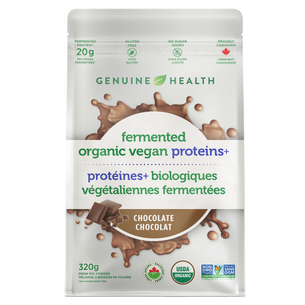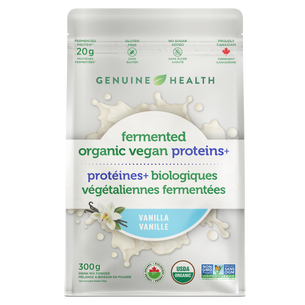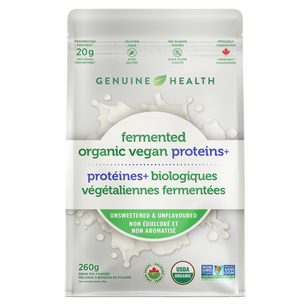FODMAPs Explained by a Gastroenterologist

In part two of Ask Dr. B, The Gut Health MD, Dr B digs into GAS. Read on to learn what one of the most common reasons for gas is, and how to avoid this common component in food—including protein supplements.
You’ve been trying to figure out how to get a handle on the gas, bloating, and abdominal discomfort, so you ask your doctor, “Hey doc, what can I eat that won’t make me blow up like a balloon?” They respond by telling you that it’s all about handling your FODMAPs…. Let me explain what they’re talking about.
FODMAP is an acronym that stands for Fermentable Oligosaccharides Disaccharides Monosaccharides And Polyols. Put simply, FODMAPs are a collection of short chain carbohydrates, or sugars, that aren’t absorbed by the gut.
As a result, they draw water into the intestine, which can cause diarrhea. By escaping digestion, they reach the lower intestine where the gut bacteria reside. These gut bacteria then feast on these carbs, in the process producing hydrogen gas along with potentially other byproducts. In people who are sensitive, such as those with irritable bowel syndrome, this can produce symptoms of gas, bloating, discomfort, and diarrhea.
There are 5 main FODMAPs to be aware of:
Since FODMAPs can cause digestive symptoms, we should eliminate them, right??? Not so fast my friend! Fructans and galacto-oligosaccharides have prebiotic actions. This means that they are fuel to grow and energize the healthy bacteria in your gut. Their restriction, in the setting of the low-FODMAP diet, may lead to a reduction in beneficial bacteria[i]. What this means is that if we want a healthy gut, then we actually need our fructans and galacto-oligosaccharides.
But let’s go back to our original discussion on protein supplements and bloating. One of the most common forms of protein supplementation is with whey, which is one of the two proteins found in cow’s milk, along with casein. What people don’t realize is that most whey protein supplements still contain high levels of lactose. So if you are lactose intolerant or are simply pounding away at those whey protein shakes a few times per day, you’re going to get yourself into trouble with gas.
My personal choice for protein is Genuine Health’s fermented organic vegan proteins+. Made with a custom blend of 7 high quality vegan ingredients – organic spirulina, organic mung bean, organic yellow pea kernel, organic pumpkin seed, organic flaxseed, organic hemp and organic brown rice – that provide a balanced amino acid profile.
The deal breaker for most plant proteins is that they’re usually derived from beans, which contain raffinose, a galacto-oligosaccharide FODMAP. Naturally, this can be hard on the gut and lead to gas, bloating and other GI distress. But with fermented organic vegan proteins+, the fermentation process dramatically reduces the raffinose[ii]. As an added bonus, fermentation actually increases the nutritive value of the protein as well, meaning better bioavailability of protein, calcium and iron[iii].
So next time you’re shopping for a protein supplement, keep in mind the value of fermentation for neutralizing FODMAPs, reducing gas and bloating, and releasing the full nutritional value in the food.
Ever been able to eat a certain food but you can’t any more? Yep, Dr. B sees this in his clinic all the time. In Part 3 of Ask Dr. B, The Gut Health MD, Dr. B weighs in on food sensitivities, and how your gut microbiome has a lot to do with your chance of developing one (or more…).
READ: Can Probiotics Help with Food Sensitivities? A Gastroenterologist Weighs In
READ: A Gastroenterologist Takes on the Top Cause of Gas and Bloating from His Clinic
READ: Want Better Digestion? Let a Gastroenterologist Tell You How to Get It
Sources:
[i] J Nutr. 2012 Aug; 142(8):1510-8.; Gut. 2015 Jan; 64(1):93-100.
[ii] J Agric Food Chem. 2017 Nov 22;65(46):10064-10073.; African Journal of Biotechnology, Vol 13(37) 3790-3796
[iii] Nigerian Food Journal, 2014. 32(1):89-96.
You’ve been trying to figure out how to get a handle on the gas, bloating, and abdominal discomfort, so you ask your doctor, “Hey doc, what can I eat that won’t make me blow up like a balloon?” They respond by telling you that it’s all about handling your FODMAPs…. Let me explain what they’re talking about.
FODMAP is an acronym that stands for Fermentable Oligosaccharides Disaccharides Monosaccharides And Polyols. Put simply, FODMAPs are a collection of short chain carbohydrates, or sugars, that aren’t absorbed by the gut.
As a result, they draw water into the intestine, which can cause diarrhea. By escaping digestion, they reach the lower intestine where the gut bacteria reside. These gut bacteria then feast on these carbs, in the process producing hydrogen gas along with potentially other byproducts. In people who are sensitive, such as those with irritable bowel syndrome, this can produce symptoms of gas, bloating, discomfort, and diarrhea.
There are 5 main FODMAPs to be aware of:
- Lactose – A disaccharide found in dairy products like milk, ice cream, and some cheeses.
- Fructose – A simple sugar found in many fruits (cherries, watermelon, apples), some veggies (asparagus, Jerusalem artichokes), high fructose corn syrup and honey.
- Fructans – Oligosaccharides found in a variety of foods, including gluten containing grains (wheat, barley, rye) as well as fruits and veggies (garlic, onions).
- Galacto-oligosaccharides – Complex sugars classically found in beans.
- Polyols – Sugar alcohols like mannitol and sorbitol, often found in artificial sweeteners and some fruits and veggies.
Since FODMAPs can cause digestive symptoms, we should eliminate them, right??? Not so fast my friend! Fructans and galacto-oligosaccharides have prebiotic actions. This means that they are fuel to grow and energize the healthy bacteria in your gut. Their restriction, in the setting of the low-FODMAP diet, may lead to a reduction in beneficial bacteria[i]. What this means is that if we want a healthy gut, then we actually need our fructans and galacto-oligosaccharides.
But let’s go back to our original discussion on protein supplements and bloating. One of the most common forms of protein supplementation is with whey, which is one of the two proteins found in cow’s milk, along with casein. What people don’t realize is that most whey protein supplements still contain high levels of lactose. So if you are lactose intolerant or are simply pounding away at those whey protein shakes a few times per day, you’re going to get yourself into trouble with gas.
My personal choice for protein is Genuine Health’s fermented organic vegan proteins+. Made with a custom blend of 7 high quality vegan ingredients – organic spirulina, organic mung bean, organic yellow pea kernel, organic pumpkin seed, organic flaxseed, organic hemp and organic brown rice – that provide a balanced amino acid profile.
The deal breaker for most plant proteins is that they’re usually derived from beans, which contain raffinose, a galacto-oligosaccharide FODMAP. Naturally, this can be hard on the gut and lead to gas, bloating and other GI distress. But with fermented organic vegan proteins+, the fermentation process dramatically reduces the raffinose[ii]. As an added bonus, fermentation actually increases the nutritive value of the protein as well, meaning better bioavailability of protein, calcium and iron[iii].
So next time you’re shopping for a protein supplement, keep in mind the value of fermentation for neutralizing FODMAPs, reducing gas and bloating, and releasing the full nutritional value in the food.
Ever been able to eat a certain food but you can’t any more? Yep, Dr. B sees this in his clinic all the time. In Part 3 of Ask Dr. B, The Gut Health MD, Dr. B weighs in on food sensitivities, and how your gut microbiome has a lot to do with your chance of developing one (or more…).
READ: Can Probiotics Help with Food Sensitivities? A Gastroenterologist Weighs In
Other articles in Ask Dr. B, The Gut Health MD:
READ: A Gastroenterologist Takes on the Top Cause of Gas and Bloating from His Clinic
READ: Want Better Digestion? Let a Gastroenterologist Tell You How to Get It
Sources:
[i] J Nutr. 2012 Aug; 142(8):1510-8.; Gut. 2015 Jan; 64(1):93-100.
[ii] J Agric Food Chem. 2017 Nov 22;65(46):10064-10073.; African Journal of Biotechnology, Vol 13(37) 3790-3796
[iii] Nigerian Food Journal, 2014. 32(1):89-96.




















































